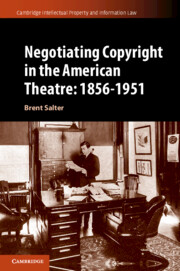Book contents
- Negotiating Copyright in the American Theatre: 1856–1951
- Cambridge Intellectual Property and Information Law
- Negotiating Copyright in the American Theatre: 1856–1951
- Copyright page
- Contents
- Figures
- Tables
- Acknowledgments
- Introduction
- Part I Mediating the American Theatre
- 1 Copyright and the Facilitation of Theatrical Production
- 2 The Publisher’s Unpublished Empire
- 3 The Enduring “Piratical” Pursuits of Alexander Byers
- 4 Brokering Theatre
- 5 Negotiating Playwright Integrity
- Part II The Organizational Response
- Bibliography
- Index
- Cambridge Intellectual Property and Information Law
5 - Negotiating Playwright Integrity
from Part I - Mediating the American Theatre
Published online by Cambridge University Press: 23 December 2021
- Negotiating Copyright in the American Theatre: 1856–1951
- Cambridge Intellectual Property and Information Law
- Negotiating Copyright in the American Theatre: 1856–1951
- Copyright page
- Contents
- Figures
- Tables
- Acknowledgments
- Introduction
- Part I Mediating the American Theatre
- 1 Copyright and the Facilitation of Theatrical Production
- 2 The Publisher’s Unpublished Empire
- 3 The Enduring “Piratical” Pursuits of Alexander Byers
- 4 Brokering Theatre
- 5 Negotiating Playwright Integrity
- Part II The Organizational Response
- Bibliography
- Index
- Cambridge Intellectual Property and Information Law
Summary
The story of the rise of the Theatrical Syndicate and the Shuberts as part of the larger mediating structures of the industry in the late-nineteenth and early-twentieth centuries has received extensive treatment in the theatre literature.1 In the second half of the nineteenth century, the industry became increasingly centralized in the hands of a small group of businesses that coordinated venue bookings and attractions. The decentralized stock houses across the country developed into a star touring system, which in turn developed into a combination system.2 Management of the physical theatre space and management of the attraction separated. As a touring system became a profitable model, individual theatres started to morph into local circuit groups. Theatrical organization centralized in the city centers, and the business of booking became essential to coordinate tours across the country.3
- Type
- Chapter
- Information
- Negotiating Copyright in the American Theatre: 1856–1951 , pp. 102 - 132Publisher: Cambridge University PressPrint publication year: 2022

